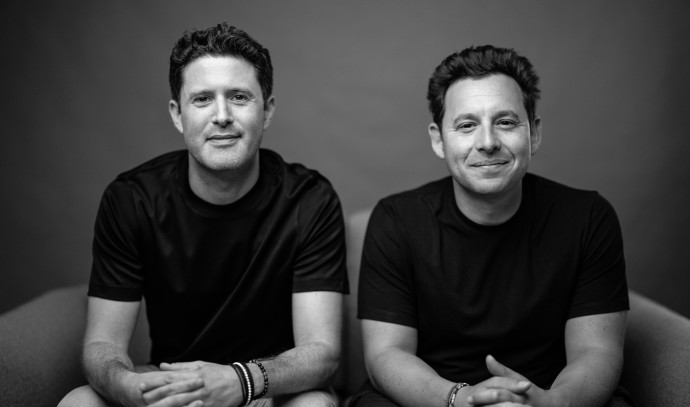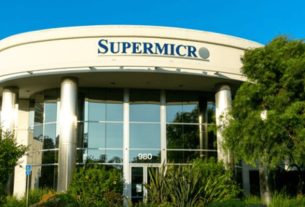When asked what their special sauce for succeeding in business and becoming self-made multi-millionaires in their late 20s to early 30s, Harley Finkelstein and David Segal both immediately answered “chutzpah.” But during an interview with The Jerusalem Post, a more substantial secret was revealed: They both stand up during most of their work day and won’t sit down during a Zoom conversation or, in this case, an interview.
“It’s because we can’t sit down,” Finkelstein said, laughing. “Harley actually introduced me to this. I am changing out all my desks,” Segal said enthusiastically, adding that “if my wife would let me, I would never stand up.” Finkelstein shared that he doesn’t even have a chair in his office.
These Jewish-Canadian entrepreneurs have recently launched a fascinating new podcast titled “Big Shot.”
“Big Shot”: Jewish-Canadian multi-millionaire millennials’ new podcast
Finkelstein is the president of Shopify, a Canadian multinational e-commerce company headquartered in Ottawa. It offers an all-in-one commerce platform that makes it easy to launch a business. Shopify generated over 4.6 billion US dollars in total revenues in the fiscal year 2021. Segal is the co-founder of Firebelly Tea and previously the “David” of DAVIDsTEA, a publicly traded Canadian specialty tea and tea accessory retailer.
These two aim to shed light on the extraordinary stories of Jewish entrepreneurs and philanthropists around the world. The podcast seeks to archive the wisdom and advice of these remarkable individuals, many of whom are in their 80s and 90s, ensuring their legacies endure for future generations. These two young entrepreneurs are in their mid-30s and have become multi-millionaires at a very young age.
Finkelstein and Segal, having achieved great success themselves, shared that they recognize the unique perspective and insights gained from their interactions with Jewish entrepreneurs. “They won’t be around for another 20 or 30 years,” Finklelstein explains the theory behind “Big Shot.” “There is no archive of them because they’re not on the Joe Rogan podcast or mainstream media outlets,” he said of the popular American podcast, as an example. As a result, they embarked on the labor of love that is “Big Shot,” dedicating their nights and weekends to producing the podcast.
Even though during the interview they look as if they are childhood friends, Finkelstein and Segal actually only met in 2015. “David had built David’s Tea, took it public, and he left shortly thereafter,” Finkelstein explained. “I had just taken Shopify public when we met and we became friends. We were both living in Ottawa and now we’re best buddies. We spend most of our time together, our families even go away together.” But Finkelstein added that “what connects us in terms of the centerpiece of our friendship and relationship is entrepreneurship, that’s what we talk about all day long. Every single day.”
The duo’s motivation to create the podcast comes from their admiration for the Jewish entrepreneurs who inspired them during their own journeys. Growing up in middle-class families, Finkelstein and Segal found themselves fascinated by the stories of these business moguls, often discussing them with great enthusiasm.
Segal, who is less outgoing than Finkelstein, shared that the two of them “idolize the people we’re interviewing now, who are essentially people that we idolized as kids.” Segal said that these Jewish entrepreneurs “were our heroes.”
Finkelstein kicks in and laughs that “most of our friends idolized Michael Jordan or some sort of musician or an actor. David and I are kind of weird and frankly, nerdy, which is what connected us to each other.” He said with a smile that when they originally met, he asked Segal, “Hey, do you know the Bronfman Family story?” He asked of the prominent Canadian Jewish family that became extremely wealthy and became one of the central American families with regards to the Jewish community. Segal, of course, knew of the Bronfmans and of other families that Finkelstein admired and asked him about.
Finkelstein: “Our parents never owned real estate but we were always so fascinated by these, like multi-generational real estate families in New York, Austin, and Toronto. So we’re sort of entrepreneur geeks.”
While the primary focus of “Big Shot” is entrepreneurship, the podcast also delves into the philanthropic endeavors of these Jewish business leaders. The hosts discovered that the line “if you make it, you give” resonates deeply with many of the interviewees. Countless Jewish entrepreneurs have channeled their success into making substantial contributions to causes such as hospitals, schools, and research institutes. The impact of their philanthropy often goes unnoticed or underappreciated, making it crucial to shed light on these acts of generosity.
Addressing the concerns about the next generation’s commitment to philanthropy, Finkelstein rejected the notion that Jewish millennials are disinterested in Jewish values or giving back. “I’m nonsense,” Finkelstein said. “I don’t think that’s the case. I think we just look at it differently,” he said of Jewish millennials. “David and I live in downtown Ottawa, the capital of Canada and we were shocked that there is no synagogue currently in the area, so my wife and I put $2 million together and built a synagogue called the Finkelstein Jewish Center,” Finklestein said with passion, as if defending his generation of Jewish philanthropists.
Finkelstein emphasized that he didn’t bring up the synagogue that he and his wife are building in order to boast, but rather to “help more people think about how they can contribute to this movement.” He added that “Big Shot,” was created in order to contribute to this movement.”
The launch of this podcast is something that is, in a way, an outing of these two young successful businessmen, as engaged Jews. “For a long time I didn’t ever necessarily want to tell people that I was a Jewish entrepreneur, even though my last name gives it away,” Finkelstein added, saying that “David is the same way on this issue.”
He laughed when saying “we both look very Jewish,” but then spoke seriously about the importance he sees in being part of the Jewish tradition. “Every Friday, if you go to my Twitter feed, I say Shabbat Shalom. Every single f***ing Friday, even though I’m not religious, but I deeply care about this culture, and so does David.”
Segal nodded with agreement, adding that “if you want to preserve your culture and make people proud of it, you need to tell your story. Therefore we need to tell our stories, our legends, our fables. ‘Big Shot’ is about how we want to archive those stories that give us connection to who we were and who we are.
“My family came here with nothing, on a boat and built up major businesses, causing our name to appear over multiple centers throughout Montreal. My family has given back tremendously and although my father is a psychologist, I grew up, far away from this world of entrepreneurship, yet it was always something for me to aspire to, that connected me both to my Judaism, to Jewish entrepreneurship and to the importance of giving back. I think for a lot of Jews, somewhere along the way, there’s a story that we’re all connected to, about what it’s like to be a Jew who has faced antisemitism, who has been an immigrant, who has had to overcome things and has hit a crossroads where they could have been a victim.”
The podcast also highlights the resilience and determination of many Jewish entrepreneurs who overcame immense hardships. Finkelstein recounts the story of Eddie Sonshine, a guest on the podcast who spent his early years in Bergen-Belsen concentration camp. Sonshine later built a real estate empire in Canada, “showcasing the indomitable spirit of many Jewish individuals who have triumphed despite starting with very little,” Finkelstein explained.
Segal said about Sonshine that he resembles exactly what is so unique about Jewish immigrants, “he told us, ‘they wouldn’t let us work in their law firms, so instead of contacting the Toronto Star [newspaper] we just started our own law firms.’ They started new hospitals or built their own [Jewish golf course. He told us something along the lines of ‘we didn’t sit around and talk about how hard we’ve had it. We got up and we did something about it.’ And I think there’s something fundamentally Jewish in that, that is timeless and that we want to connect people to through these stories.”
Beyond their personal stories, Finkelstein and Segal emphasize the broader impact Jewish entrepreneurs have had on society. From Nobel laureates to prominent names adorning hospitals and research institutes, Jewish contributions often remain under the radar. They believe it is essential to celebrate these achievements and raise awareness among both the Jewish community and non-Jewish individuals, demonstrating that Jewish entrepreneurs have made significant contributions to various fields.
Segal: “We’ve been told that we, especially in the diaspora, have to be quiet and blend in; not to make too much noise. What I’m trying to say is that I think we, as Jews, need to be respectful, be part of a community but that doesn’t mean we can’t be proud of who we are, where we come from and what we do for our community, as well as for the broader communities.”
“Big Shot” has been produced at the highest level possible and includes high-resolution video with many cameras, angles and super high-quality sound. Listening or watching this podcast is as if you were watching a 60 Minutes segment on television, but with two sharp businessmen that have an amazing chemistry with each other, since they literally are best friends, in a nerdy-entrepreneury way. They interviewed businessmen such as Charles Bronfman, who was also one of the founders of Birthright Israel and Aldo Bensadoun “who built a billion-dollar shoe brand from scratch,” while creating the Aldo shoe company, as an immigrant from Morocco. They also interviewed Jonathan Wener, chairman and chief executive of Montreal-based property development firm Canderel, who “turned a 10k loan into a $15 billion empire,” as Finkelstein and Segal write on their website. Every episode is also fully transcribed, something that can be very useful to many.
“Big Shot” has garnered an overwhelmingly positive response, with thousands of listeners captivated by the wisdom shared by the guests. Finkelstein and Segal have received numerous suggestions for future interviews and express their gratitude for the opportunity to preserve these stories. They plan to go on a tour to the US, Israel and possibly Europe, in order to interview other “legends” as they see them. By documenting and sharing the experiences of these entrepreneurs, they hope to inspire an entirely new generation of business leaders who will continue to uphold the values of entrepreneurship and philanthropy.
Finkelstein said towards the end of the conversation that he hopes more Jewish philanthropists create social ventures in an entrepreneurial way, just as Bronfman did when he created Birthright Israel. “When he tells the story of how he created Birthright, he basically says: ‘Look, I’m going to give $15 million for year one,’ on his own [for establishing Birthright] and said, F**k it, let’s see where this goes. And now 800,000 young people have gone through Birthright, but it started on an impact scale, as opposed to a sort of blind Tzedaka [charity.] That’s where I see Jewish philanthropy going and it’s a great direction to be going in.”


